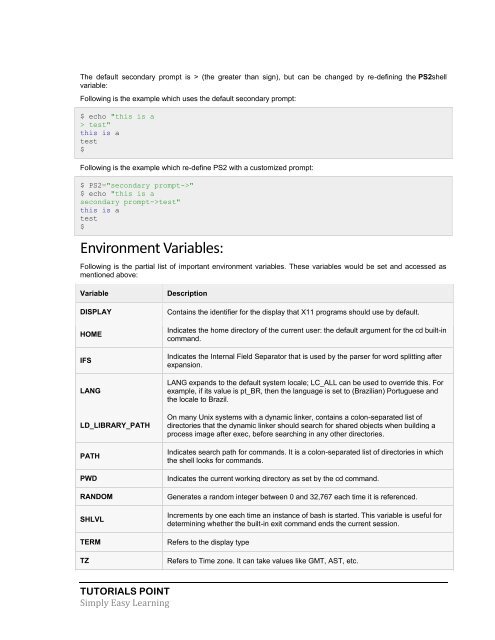You also want an ePaper? Increase the reach of your titles
YUMPU automatically turns print PDFs into web optimized ePapers that Google loves.
The default secondary prompt is > (the greater than sign), but can be changed by re-defining the PS2shell<br />
variable:<br />
Following is the example which uses the default secondary prompt:<br />
$ echo "this is a<br />
> test"<br />
this is a<br />
test<br />
$<br />
Following is the example which re-define PS2 with a customized prompt:<br />
$ PS2="secondary prompt->"<br />
$ echo "this is a<br />
secondary prompt->test"<br />
this is a<br />
test<br />
$<br />
Environment Variables:<br />
Following is the partial list of important environment variables. These variables would be set and accessed as<br />
mentioned above:<br />
Variable<br />
DISPLAY<br />
HOME<br />
IFS<br />
LANG<br />
LD_LIBRARY_PATH<br />
PATH<br />
PWD<br />
RANDOM<br />
SHLVL<br />
TERM<br />
TZ<br />
Description<br />
Contains the identifier for the display that X11 programs should use by default.<br />
Indicates the home directory of the current user: the default argument for the cd built-in<br />
command.<br />
Indicates the Internal Field Separator that is used by the parser for word splitting after<br />
expansion.<br />
LANG expands to the default system locale; LC_ALL can be used to override this. For<br />
example, if its value is pt_BR, then the language is set to (Brazilian) Portuguese and<br />
the locale to Brazil.<br />
On many <strong>Unix</strong> systems with a dynamic linker, contains a colon-separated list of<br />
directories that the dynamic linker should search for shared objects when building a<br />
process image after exec, before searching in any other directories.<br />
Indicates search path for commands. It is a colon-separated list of directories in which<br />
the shell looks for commands.<br />
Indicates the current working directory as set by the cd command.<br />
Generates a random integer between 0 and 32,767 each time it is referenced.<br />
Increments by one each time an instance of bash is started. This variable is useful for<br />
determining whether the built-in exit command ends the current session.<br />
Refers to the display type<br />
Refers to Time zone. It can take values like GMT, AST, etc.<br />
TUTORIALS POINT<br />
Simply Easy Learning



